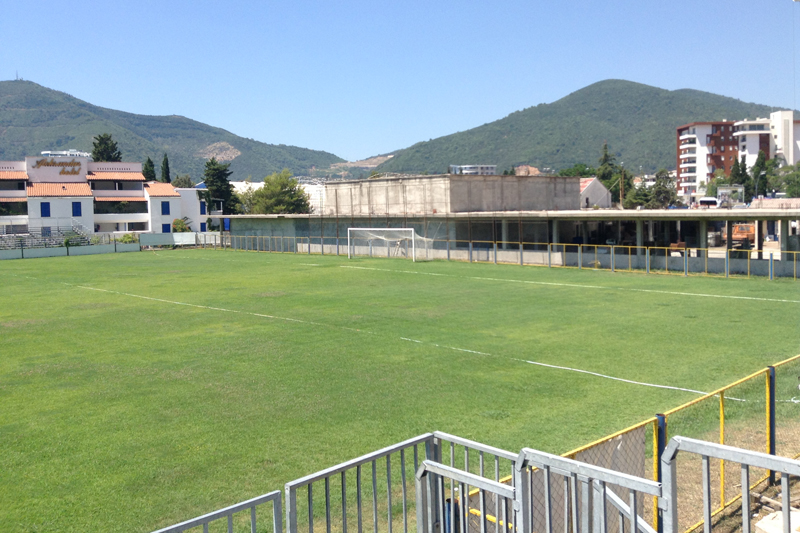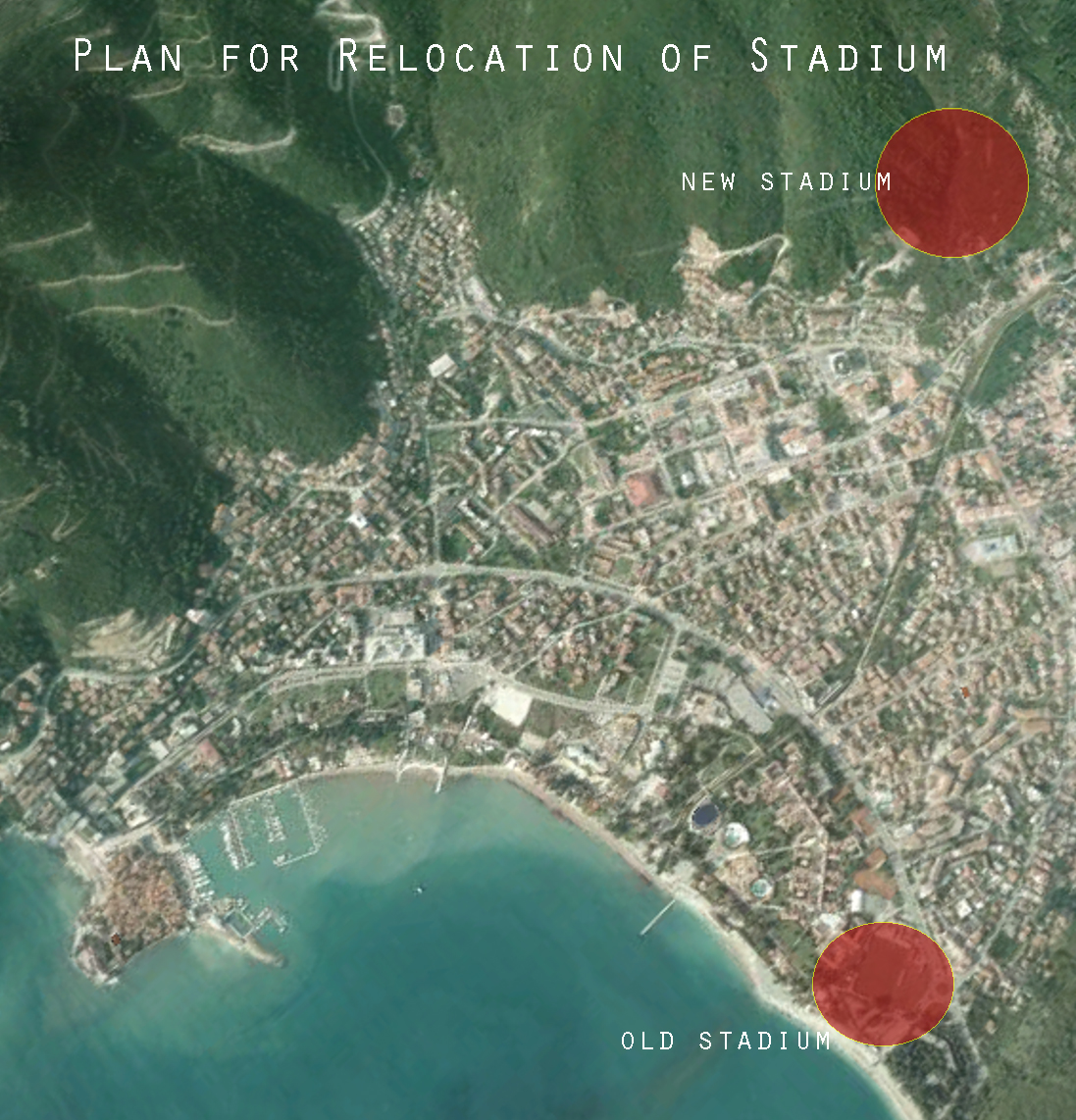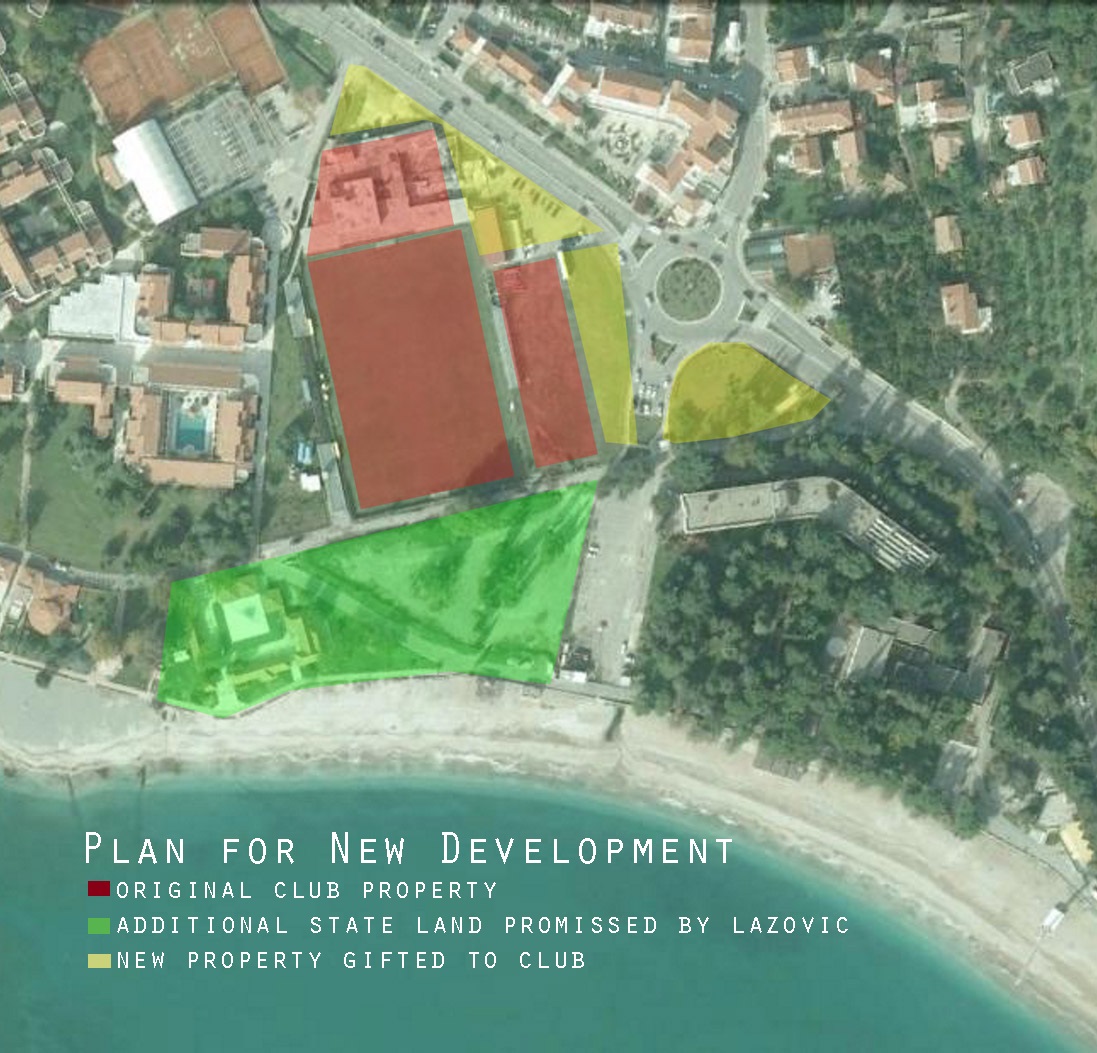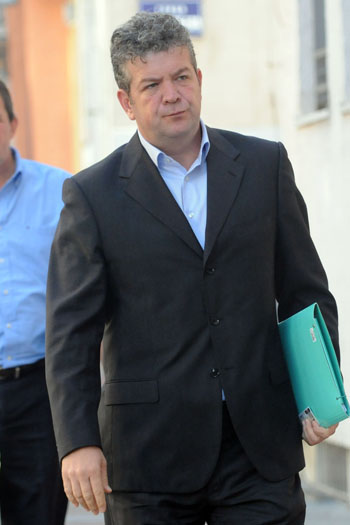
The Mogren Football Club of tiny Budva, Montenegro thrilled fans in 2009, winning the Montenegrin First League title and qualifying for a chance at the UEFA Champions League for the first time.
The team did well but lost in the second round of qualifying play in mid-July. But team officials conspired only two days later to deal the club a far bigger blow: the club director gave away the land used as the team’s longtime stadium, which sits on a valuable piece of property just 50 meters from the sea in the heavily built-up tourist haven of Budva. It is the only large tract of land near the beach remaining in Budva.
The land was publicly owned and not his to give.
The deal remained secret for three months, until the contract was mysteriously distributed as a flyer across Budva naming the new owners. Faced with public scrutiny, the director said the investors, a man from France and one from Switzerland, would present a design for the land in a few months.
He lied, and with a reason.
Business records obtained by the Organized Crime and Corruption Reporting Project (OCCRP) show that club director Boro Lazovic had made a secret deal with Darko Saric, the indicted leader of a powerful Balkan criminal organization that has for years trafficked cocaine from South America into Europe.
The deal is one of many in Montenegro that has linked business, government and organized crime in a tightly wound relationship. These unholy alliances have increasingly given Montenegro an international reputation as a criminal state.
Public Land in Private Hands
Mogren has had all it takes to be a successful club. It has loyal fans, is owned by the local municipality, is well-financed by local authorities, and its board was then headed by Rajko Kuljaca, who had always been a supportive mayor. Lazovic, the club director, is well known in Budva as an influential local businessman and head of the Budva branch of the ruling Democratic Party of Socialists (DPS), the party run by Milo Djukanovic, Montenegro’s Prime Minister and the man who decides everything in the country.
In 2007, the city said it would give the club a new home and a new stadium to replace the basic facility where the team played. In November of that year, local authorities decided to deed the football club nearly 80,000 square meters of land, the size of 11 standard football pitches, located in a remote area on the slopes of Dubovica Hill.
The city also gave the club a far more valuable piece adjacent to their current stadium. That land, valued at €7 million (US$9.75 million), is located in the Lugovi area of Budva, just 50 meters from the beach next to the tourist complex Slovenska Beach, named after a group of Czech tourists who spent their holidays there in 1935. Lazovic promised in local newspapers that the club would not sell their new and valuable public land.
The gift was made despite protests from the opposition and the descendants of the land’s former owners. Following World War II, the Communist regime had confiscated the land and other assets of rich families. In March 2004, Montenegro had passed a law allowing the return of unused land, and various families opened proceedings to get their land back. So far they have failed.
But despite the decision, local authorities waited more than one year until January 2009 when Mayor Kuljaca and club director Lazovic signed a contract to make the transfer.
Lazovic was true to his word that he would not sell the land. Instead, he gave it away.
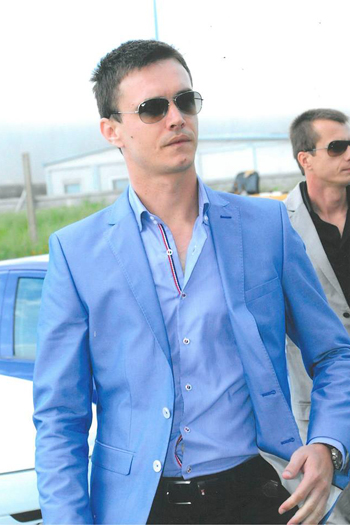
Less than a month after the transfer, before the new land had even been officially registered in the name of the club, Lazovic signed a partnership deal with two companies: Nova Star CG and Amsone Enterprises Montenegro. The deal transferred the land near the beach and the rest of the club’s coastal land including its stadium, a total of 20,000 square meters, to a company that had not yet been formed, called Novastar Investment CG. Lazovic also threw into the deal an additional 8,000 square meters of adjacent beachfront land that was owned by the state. The contract does not provide details on how the club would get that additional public land, and appears to ignore the law requiring a public tender for the sale of public land.
Not only did Lazovic give away the club’s publicly owned land, he never asked or got approval from the club’s board or from local authorities, as required by law.
According to the contract, the two companies and FC Mogren would join together to form Novastar Investment CG. Amsone Enterprises Montenegro would administer the project, while Nova Star CG would pay for construction of a mixed residential and commercial complex on the land which would include two towers and a business center. The investment company would also pay for a 15,000-seat stadium on the club’s land in the hills. It did not specify where the money would come from. But according to its financial reports, the company had no income or other sources of money and began piling up losses from day one.
The first director of Novastar Investment CG, and the man Lazovic signed the contract with, was Bosko Krlovic, an employee whose usual job for the football club was mowing the grass.
Krlovic refused to comment.
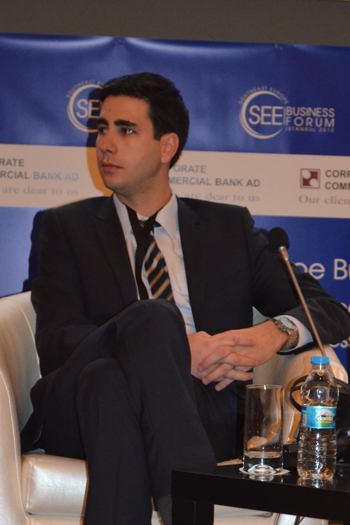
Mixing Politics with Cocaine Money
Novastar Investment CG was incorporated in Montenegro in March 2009, three weeks after the deal was signed, listing road and highway construction as its primary business activity. The publicly owned Mogren football club owned just 5 percent of the company despite putting millions of dollars’ worth of prime coastal property into the deal; Amsone Enterprises Montenegro, 20 percent; and Nova Star CG the remaining 75 percent.
Amsone Enterprises Montenegro is owned by a similarly named Cyprus company, which is in turn owned by Elisano Holdings Limited, a company incorporated in the British Virgin Islands, a secretive offshore jurisdiction often used to hide ownership. Montenegrin authorities did not release all records they had on the company.
While the owner of this company remains unknown, OCCRP tracked down who was behind Nova Star CG, the biggest shareholder.
Incorporation records show Nova Star CG is owned by Nova Star LLC, which, in turn, is owned by Nikomat LLC. Both companies are registered in the US state of Delaware, another jurisdiction commonly used by criminals in the Balkans and Eastern Europe to hide their illegal proceeds. Nikomat LLC is jointly owned by Saric’s sister, Danijela, and his childhood friend, close associate and best man, Nebojsa Jestrovic, who was indicted in Serbia in 2010 for being Saric’s chief money launderer. Jestrovic is currently on trial.
The Director of Nova Star CG is Blagota Radulovic, a former employee of the Montenegrin Investment and Promotion Agency and currently deputy minister and the head of the Sector for Payment at the Ministry of Agriculture and Rural Development of Montenegro. Radulovic ran a project at the Ministry that has been implicated in a vote buying scandal for Djukanovic’s DPS party using World Bank funds although no charges have been filed.
Radulovic could not be reached for comment.
In late October 2009, when the contract was leaked to the public, the families who had formerly owned the land expressed outrage. Budva officials said they knew nothing of the deal.
Lazovic told the Montenegrin daily newspaper Vijesti on Oct. 29, 2009, that the club would get a brand new 15,000-seat stadium and a 5 percent cut of the yet-to-be-designed real estate project. But the actual contract showed the club would not have any ownership of the new residential and business complex on the beach. That would be one quarter owned by Amsone Enterprises Montenegro and its secret owner and three-quarters owned by drug lord Saric. In addition, they planned to build a second complex next to the new stadium, but again the club would be left out and would not own any share in that complex, that would be fully owned by Saric’s Nova Star CG.
Lazovic never mentioned Saric, but claimed he couldn’t remember the names of the investors at first, describing them as two men from France and Switzerland. He later changed the story to say it was a French-Swiss company.
He did reveal one other detail: that the deal signed six months earlier was actually arranged in early 2008. That corresponds with the period when Saric started to pour his drug money into Montenegro, according to indictments in different countries.
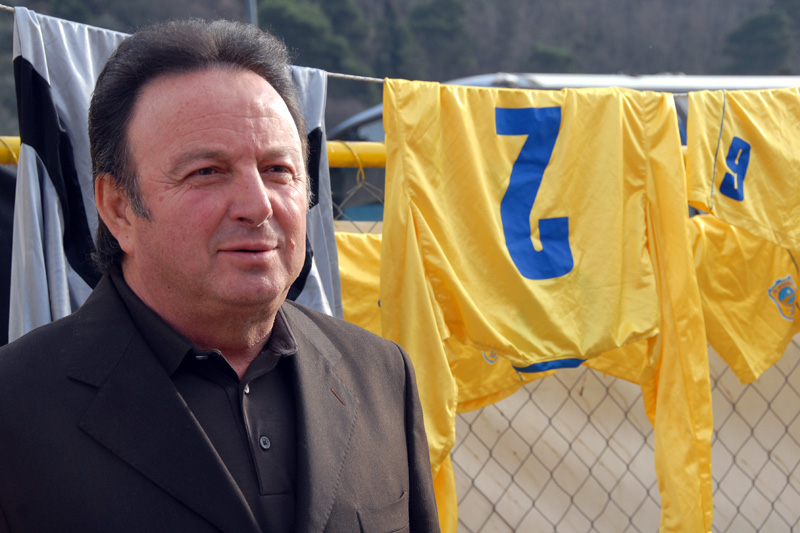
“A year and a half ago we had a concrete deal. It was supposed to be in motion, but the crisis happened,” said Lazovic, referring to the global financial crisis of 2008. “The question is whether they are willing to enter into these investments, because they are not small.”
Lazovic could not be reached for comment.
Another crisis that had nothing to do with global finance had also occurred. Just two weeks earlier, in early October 2009, more than two tons of Saric’s cocaine were seized near the Uruguayan coast on a luxury yacht. Saric evaded arrest despite months of surveillance by the police and was on the run for more than four years until his arrest in March 2014.
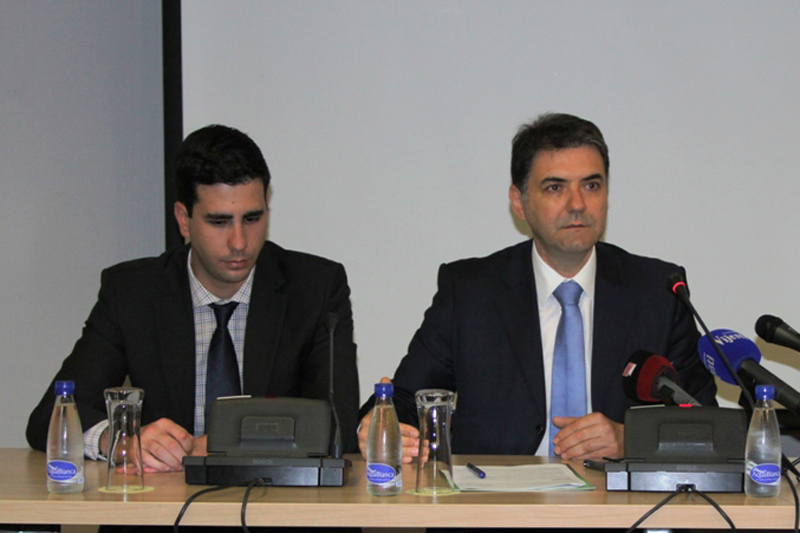
In early 2010, Nova Star CG’s shares in the company were transferred to Panama-based Adriatic Overseas Holdings. Adriatic Overseas Holdings is an important company that ultimately connects Darko Saric, Serbian businessman Stanko Subotic and Milo Djukanovic, three people who were intimately tied together through First Bank and a series of real estate deals.
For example, Adriatic Overseas Holdings took over the bankrupt San Investments, a company that Central Bank documents say is among a group of companies owned by Subotic, a controversial Serbian businessman and close friend of Djukanovic. In October 2009 Saric did Subotic’s company a great service when he provided money to secure loans for San Investments through First Bank, the bank owned by Djukanovic’s family.
The real ownership of Adriatic Overseas Holdings is unknown, but one man who knows the truth is the current Minister of Agriculture of Montenegro, Petar Ivanovic, a man close to the Prime Minister and a professor at his private university. Ivanovic’s employee, Blagota Radulovic was the director of Saric’s Nova Star CG. He was also previously the director of the Montenegrin Investment and Promotion Agency where Radulovic also worked as his employee.
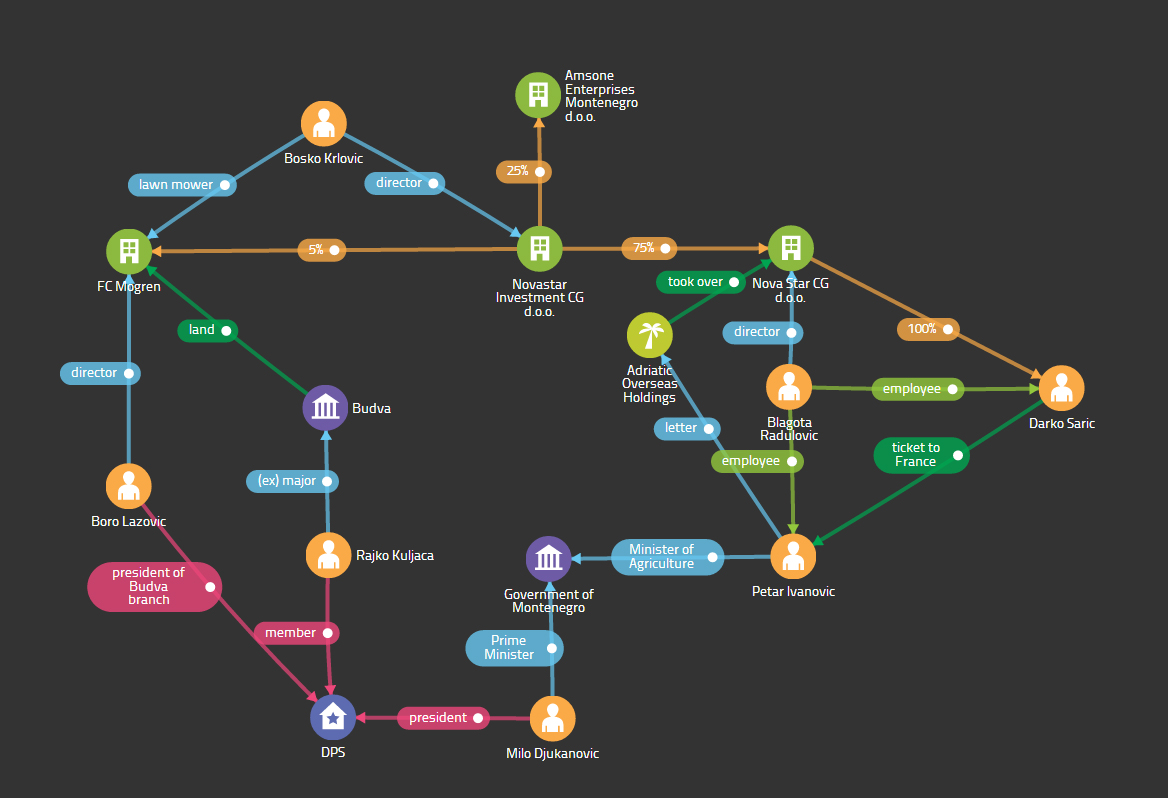
Djukanovic has been closely associated with Ivanovic and the issue of foreign investment for years. In December 2013, Djukanovic’s government appointed Ivanovic to the Council for Foreign Investments, which is chaired by the prime minister himself.
According to a letter found in the Montenegrin business records, a power of attorney document for Adriatic Overseas Holdings was sent to Ivanovic’s home address in Montenegro by the Panamanian registration firm that incorporated the company. The letter said Adriatic Overseas Holdings instructed them to send the documents to him, indicating Ivanovic is somehow related to the company.
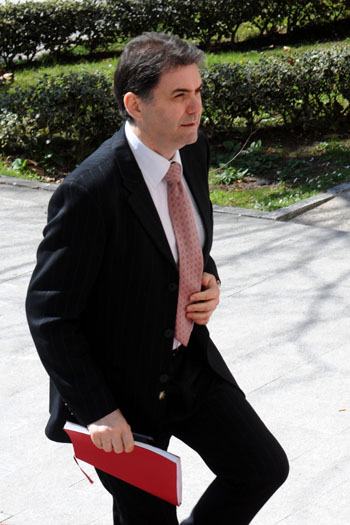
The power of attorney for Adriatic Overseas Holdings was in the name of Zorica Djukanovic (it is not clear if she is related to the prime minister). The lawyer, like many people involved in the deal, is tied to both the Djukanovic family and Darko Saric. Zorica Djukanovic previously represented Aco Djukanovic, the brother of the prime minister, in a real-estate deal. She also defend a Saric associate named Jovica Loncar who was accused of laundering Saric’s drug money, as well as the widow of Dragan Dudic, a Saric associate murdered in 2010 in Kotor in Montenegro.
There are other connections between Ivanovic and Saric. Montenegrin daily Dan revealed last year that Ivanovic traveled to France with Saric associate Loncar. Dan revealed records from the travel agency showing that the tickets for both men were bought at the same time and place by the same person and that Saric paid. Ivanovic told Dan he did not know Saric and said he sees no reason for further communication.
Ivanovic did not agree to an interview with OCCRP.
In January 2011, Montenegrin police seized documentation on the transfer of public land to the FC Mogren club and started an investigation of club officials. Their investigation was completed and a report sent to the Montenegrin Supreme State Prosecutor for Organized Crime. The prosecutor has not acted in more than three years on the case.
In March 2012, Lazovic announced, “The foreign company gave up on the project because they couldn’t find funding for the investment.”
The club registered the land in its name in 2012 but the project is still ongoing and the government approved the development last year. Meanwhile, the status of Adriatic Overseas Holdings in the contract is still not clear and all records are being held by the prosecutor. Who owns the development now and where the money will come from is, like so many things in Montenegro, also not clear.
Along with Mogren fans, the other losers are the descendants of the original land owners. They didn’t want to talk on the record because they are still fighting for their land, but in several interviews members said that the city had a legal obligation to return the land but has instead done everything they can to stop the return. Said one: “Behind this are people who are connected through family and best friends. If someone does not want to return assets then they will do everything make sure that does not happen.”
CINS contributed to this story.

